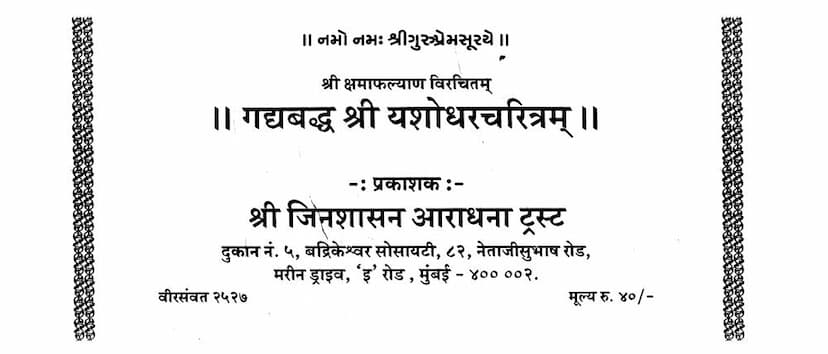Gadyabaddha Yashodhar Charitram
Added to library: September 1, 2025

Summary
Here's a comprehensive summary of the Jain text "Gadyabaddha Yashodhar Charitram" by Kshamakalyan, based on the provided pages:
Book Title: Gadyabaddha Yashodhar Charitram (Prose version of Yashodhar's Life Story) Author: Muni Kshamakalyan Vijayji Publisher: Shri Jinshasan Aradhana Trust Sponsorship: Published in memory of Chaturmas of Muni Shri Sanvegvardhan Vijayji M.S. and Muni Shri Hiranyabodhvijayji M.S. in Samvat 2056, with support from Shri Tapagachh Jain Samaj, Mulund (Mumbai). Re-publication: This is a re-publication of a text originally composed in Sanskrit by Muni Shri Kshamakalyan Vijayji in Samvat 1839. It was previously revised by Amritlal Amarchand and published by A.M. Company in Samvat 1974. The current publishers express gratitude to the previous researchers and publishers.
Core Theme and Purpose: The text aims to instill a sense of renunciation (vairagya) and detachment by narrating the life story of King Yashodhar. It emphasizes the profound impact of past actions (karma) and the importance of compassion and non-violence (ahimsa) in achieving spiritual liberation.
Source and Context: The preface highlights that this prose version is based on the famous "Samarādityā Kahā" (in Prakrit) by Acharya Shri Haribhadra Suri M.S., which describes the nine lives of Samarāditya Kumara. The story of Yashodhar, which is part of the fourth life (Dhanayakumar), is considered particularly thrilling and detachment-inducing. The author felt the original Sanskrit poetic version might not be easily understood, hence the creation of this prose rendering for wider comprehension.
Spiritual Precepts and Guidance: The text opens with the Panch Namaskar Mantra, considered the supreme auspiciousness. It is dedicated to and inspired by various revered Jain acharyas and monks, highlighting the lineage of spiritual guidance. The core message is that true happiness and spiritual attainment are achieved through righteous conduct, detachment, and adherence to the teachings of the Jinendra (Jain Tirthankaras).
Narrative of Yashodhar's Lives (Karmic Consequences): The central part of the text details the eight lives of Yashodhar and his mother, Chandramati, illustrating the karmic consequences of their actions, particularly those related to violence and attachment.
- First Life (King Maridatta): King Maridatta of Ujjain, blinded by delusion and attachment to sensory pleasures, worships the fierce goddess Chandika with immense violence, sacrificing animals and even human couples. He is eventually killed by the poison administered by his wife, Nayanavali, who is having an affair. His mother, Chandramati, dies of grief.
- Second Life (Peacock and Dog): Due to the karma of killing a piglet (which was considered a form of meat for the goddess), Yashodhar is reborn as a peacock and his mother as a dog. They are both killed by their former relatives in unfortunate circumstances.
- Third Life (Mongoose and Serpent): Reborn as a mongoose and a serpent respectively, they continue their karmic cycle of conflict and destruction, ultimately meeting their demise through predation by other creatures.
- Fourth Life (Fish and Crocodile/Shark): As a fish and a large water creature (praha/shark), they are caught and killed by fishermen, their bodies prepared and consumed by their own relatives.
- Fifth and Sixth Lives (Goat and Sheep, then Goat and Ram): In these lives, they experience further cycles of familial attachment and death, with Yashodhar being reborn as a sheep/ram and Chandramati as a goat. These lives highlight the complex and often ironic nature of karmic retribution, where one might even kill and consume their own relative's flesh.
- Seventh Life (Chicken and Chickens/Ram and Goat): Reborn as chickens, they are sold and eventually killed as part of a ritual. The karmic consequences are so severe that even in this seemingly insignificant birth, their actions and relationships are intertwined with their past.
- Eighth Life (King Surendradatta and Queen Jayavali/Chandramati): Yashodhar is reborn as King Surendradatta of Avanti, and Chandramati as his queen, Jayavali. Due to intense attachment and the influence of past karma, they engage in worldly pleasures. Yashodhar, in his pursuit of spiritual knowledge, receives guidance from Acharya Sudatta and experiences a profound realization of his past lives and the futility of worldly attachments. He renounces his kingdom and attains liberation, along with his mother and others who embraced the path of righteousness.
Key Moral and Spiritual Lessons:
- Ahimsa (Non-violence) is Paramount: The most crucial teaching is that violence, even on a small scale, leads to immense suffering and perpetuates the cycle of birth and death. The story of Yashodhar, from King Maridatta's gruesome sacrifices to the seemingly minor act of killing a dough-chicken, demonstrates that all forms of violence have dire karmic consequences.
- The Power of Karma: The narrative powerfully illustrates the principle of karma, showing how actions in one life directly influence future births and experiences. The complex relationships and transformations across different species highlight the inescapable nature of karmic retribution.
- Renunciation (Vairagya) and Detachment: The story consistently emphasizes the need to detach from worldly pleasures, possessions, and relationships, which are seen as the root cause of suffering and the cycle of rebirth. The ultimate goal is to achieve liberation (moksha) through spiritual practice and renunciation.
- The Importance of True Knowledge: The text contrasts the ignorance of those who follow false doctrines (mithyatva) and engage in violent rituals with the wisdom of those who follow the path of the Jinas. True spiritual progress comes from understanding the true nature of reality and the self, as taught by the Tirthankaras.
- The Role of Teachers (Gurus): The guidance and wisdom of enlightened teachers, like Acharya Sudatta, are crucial for understanding the path of liberation and overcoming the cycle of karma.
The Text's Contribution: "Gadyabaddha Yashodhar Charitram" serves as a vital tool for spiritual education, making the profound teachings of Jainism accessible through a captivating narrative. It encourages readers to reflect on their own actions, cultivate compassion, and strive for a life of spiritual purity and detachment.
This summary provides a comprehensive overview of the provided pages, highlighting the key elements of the text.